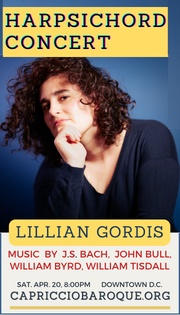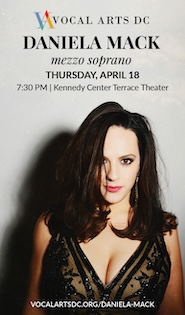Surprises abound in Brenda Rae’s assured Vocal Arts debut

Brenda Rae has made many striking appearances at Santa Fe Opera in recent years, none more stunning than her star turn in Lucia di Lammermoor in 2017. The Wisconsin-born soprano has finally come to Washington to make a stellar debut with Vocal Arts DC, presented Sunday afternoon in the Kennedy Center Terrace Theater. A delightfully varied program revealed both an effortless vocal technique and a sure musical sense.
The afternoon also showed Rae to be absolutely unflappable in the face of unpredictable vexations. About halfway through a somewhat sleepy set of songs by Fanny Mendelssohn, the theater’s fancy new electrical system went haywire, producing a short, thunderous sonic boom of feedback noise that made the lights go dim.
According to the presenter, the technical crew was trying to feed sound from the stage to the monitor in the lobby. By mistake, they fed the sound through the house sound system, and drove it into feedback mode. Hopefully a prominent sign will be put in place to warn others never to make that mistake again.
To their credit, Rae and her excellent pianist, Jonathan Ware, somehow kept performing right through it. Utterly composed, Rae then stopped the performance and said with a laugh, “Let’s start this again.” She also noted that her first thought hearing that explosive sound was that the subtitle of the poem in that song, “Wo kommst du her?,” is “Der Komet.” As Rae put, “I thought, that’s it,” the comet has struck.
This event, although unfortunate, only made the musical achievement of this recital more noteworthy. Given Rae’s triumphs on stage as Norina in Don Pasquale, Lucia, and Zerbinetta in Strauss’s Ariadne auf Naxos, songs with coloratura pyrotechnics fell easily into her wheelhouse. In the opening Richard Strauss set, examples came in the flighty, doting mother of “Muttertändelei” and the flirtatious “kling klangs” of “Schlagende Herzen.”
Although this is her strength, Rae opened the set instead with “Die Nacht,” which demanded a soft, silken thread of sound. She answered this challenge with floating pianissimo high notes and a seamless tone. In “Befreit,” Rae’s voice opened, flower-like, on the ecstatic refrains of “O Glück!” With the final song, “Frühlingsgedränge,” Rae rounded out this knockout set in a gorgeous spirit of quiet rapture.
By comparison the most striking part of the Fanny Mendelssohn songs was the feedback disaster, except for some limpid notes off the staff in the final song “Bergeslust” and the tragic melodic solitude of “Warum sind denn die Rosen so blass?” The fireworks often came from Jonathan Ware at the piano, especially in his right hand’s constant flow of notes in “Wanderlied.”
Ware’s technique also sparkled in a more effective set of Liszt songs, as in the repeated-note patterns of “Comment, disaient-ils.” Rae again deployed more of the diaphanous side of her voice in “Es muss ein Wunderbares sein” and the lovely “Bist du.” Rae luxuriated in the subtle turns of “Oh! quand je dors,” especially the surprise final phrase, which evaporated in sensuous quietness.
Two more contemporary American sets on the second half rounded out this portrait in music. In Dominick Argento’s daunting Six Elizabethan Songs, from 1957, both Ware and Rae met the demands of virtuoso songs like “Winter” and “Diaphenia” with calm assurance. At the same time, sublime stillness reigned over quiet moments like “Sleep,” “Dirge,” and the hypnotic “Hymn,” an ode to the moon. Rae’s English diction is impeccable, a quality proved when the supertitle machine went dark during one of the songs.
The ultimate triumph came with the world premiere of Lowell Liebermann’s brilliant Five Songs on Poems by Jean Starr Untermeyer. Composed specifically for Rae to poems selected by Rae from Untermeyer’s oeuvre, the songs fit her voice like a glove; the pianissimo high notes glimmered above the meandering, oscillating harmony of “Lake-Song.” Although Liebermann’s conservative style harkens back to tonality and traditional forms, dissonance clotted the harmony in songs like “Berkshire Twilight.”
The fiendishly difficult lop-sided metric patterns of “New Tributes” stretched both Ware and Rae to the limits, especially the incredibly difficult moto perpetuo in the keyboard part. “Mist” then provided an antidote immediately after it, a mesmerizing song, its slow movement hanging in the room like the lake-enveloping mist that “shrouds the colors and the sounds as well.” Murmuring, harp-like accompaniment patterns set the tone of “Forget-Me-Nots,” leading to crazed super-high notes that accompanied the climax of the poem.
Although many facets of Rae’s voice shone in this recital, it was Zerbinetta that won out in the single encore, the fluttery showpiece of Richard Strauss’s “Amor.” Executed to perfection, it was a thunderbolt of a different kind.
Vocal Arts DC presents baritone Christian Gerhaher and pianist Gerold Huber in an all-Mahler program 7:30 p.m. October 18. vocalartsdc.org







